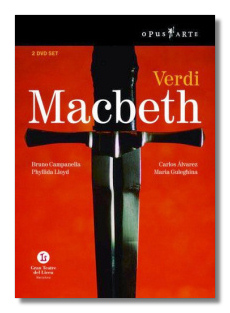
The Internet's Premier Classical Music Source
Related Links
- Verdi Reviews
- Latest Reviews
- More Reviews
-
By Composer
-
Collections
DVD & Blu-ray
Books
Concert Reviews
Articles/Interviews
Software
Audio
Search Amazon
Recommended Links
Site News
 DVD Review
DVD Review
Giuseppe Verdi

Macbeth
- Carlos Álvarez – Macbeth
- Maria Guleghina – Lady Macbeth
- Roberto Scandiuzzi – Banquo
- Begoña Alberdi – Lady-in-waiting
- Marco Berti – Macduff
- Javier Placios – Malcolm
- Ferran Ilari – Fleance
- Stefan Kocan – Physician
- Josep Ferrer – Manservant
- Francisco Santiago – Assassin
- Ivo Mischev – Herald
Symphony Orchestra & Chorus of the Gran Teatre del Liceu/Bruno Campanella
Recorded live at the Gran Teatre del Liceu, Barcelona – March 30 and April 2, 2004
Opus Arte DVD OA0922D 2DVDS LPCM Stereo Dolby Digital DTS Anamorphic Widescreen
Director Phyllida Lloyd's central metaphor in this production is a golden cage, a gilded cube which represents both the human mind and the psychological jail cell in which both Macbeth and his wife imprison themselves. This point is given particular poignance in the Banquet Scene. The royal couple entertains their guests from within the cube, which is the only "furniture" on stage – there is no table for the guests to eat at, no chairs for them to sit in, and not even any goblets from them to drink from. When Macbeth breaks down after twice seeing an apparition of the murdered Banquo, he and his wife are more like animals in a zoo – admittedly glittering animals in a glittering cage – than human beings with whom their guests can identify. As the plot progresses and the royal couple's lives collapse through their own wicked ambition, time and space are increasingly disrupted. After Macbeth consults the witches in Act Three, they put him to bed, where he awakens after having dreamed of dandling babies, reading tales to his children, and enjoying the other benefits of family life. (We are reminded of his wife's barrenness at the start of the Sleepwalking Scene, when she tenderly holds a doll she has found of the floor.) Then the conjugal beds are separated, and both Macbeth and his Lady remain onstage, still on or in their beds, during the scene with the Scottish refugees. A few of Lloyd's innovations go contrary to Piave's libretto. (Where are the witches' "dirty beards"? Red caftans and all, this is one stylish coven!) Also, Lady Macbeth's entrance during the Sleepwalking Scene loses some of its effectiveness because she has been seen sitting in her bathtub, still scrubbing at those imaginary bloodstains, just moments before.
Verdi requested a soprano with the voice of a she-devil for his "Lady," and soprano Maria Guleghina supplies one, although one wonders whether or not she is making a virtue out of necessity. I am less bothered by the pronounced wobble on some of her high notes than I am by her habit of singing behind the beat… that is, when she is not rushing it. There's much sloppy singing to be heard here, although it is excitingly sloppy. Her acting doesn't quite cross the lines into camp, but, given her lack of subtlety, it comes close. (Of course, the audience eats it up.) Baritone Carlos Álvarez sings the title role handsomely, and he has the right look for the role, but he fails to convince us either of Macbeth's ruthlessness or of his guilt; "Pietà, rispetto, amore" makes little impression. Bass Roberto Scandiuzzi is a strong Banquo – no wonder Macbeth killed him off! In terms of technique and interpretation, Scandiuzzi's performance of "Come dal ciel precipita" is the highlight of the evening. Marco Berti is resplendent, if a little metallic in tone, in "Ah, la paterna mano." The smaller roles are done well, and the chorus contributes strongly throughout. Campanella conducts crisply, but the orchestra's string section sounds understaffed. The witches' Act Three ballet is omitted, and I shed no tears over that, given the weakness of Verdi's music here, compared to the rest of the opera.
The first two acts are on the first DVD, and the last two are on the second. The first DVD also includes a five-minute illustrated synopsis of the plot and a cast gallery. Both sound (LPCM stereo or DTS digital surround) and picture (Anamorphic Widescreen) are excellent, as are the English subtitles. This production was recorded on March 30 and April 2, 2004 in Barcelona's Gran Teatre del Liceu.
Copyright © 2005, Raymond Tuttle




















